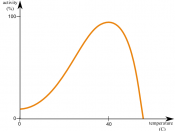Aim: The aim of the experiment is to test the effect temperature has on the activity of the enzyme rennin.
Hypothesis: I believe the rate of reaction will speed up as the temperature increases until it reaches about 37oC, which is the body temperature, where it will begin to slow down and stop reacting. I believe this will occur because enzymes have a temperature range at which they work best in and once the temperature goes out of this range the enzyme will stop working.
Introduction:Enzymes are made up of proteins which are produced within living cells and act as catalysts which speed up chemical reactions. They are made up of long chains of amino acids containing carbon, hydrogen, oxygen and nitrogen. Enzymes are structured to be unique to a few but often only one substrate therefore being specific to one type of reaction. A substrate is the molecule that an enzyme acts upon.
An enzyme has an active site which is shaped for a specific shaped substrate. The substrate and the enzyme bind together at the active site and form an enzyme-substrate complex. This then breaks down to form the products, releasing the enzyme. During the reaction the enzyme does not undergo change.
Most organisms can only survive within certain temperature ranges. For reactions to occur substances must collide with the correct orientation and necessary amount of energy, called the activation energy. The role of the enzyme is to lower the activation energy which therefore allows chemical reactions to take place inside organisms without the temperature having to be so high as well as speeding up the reaction. Every enzyme has a certain temperature range where it can work most efficiently with an optimal temperature at about 37.5 0C for most enzymes within the body. Once the temperature goes...



Great
Comprehensive report.
0 out of 0 people found this comment useful.